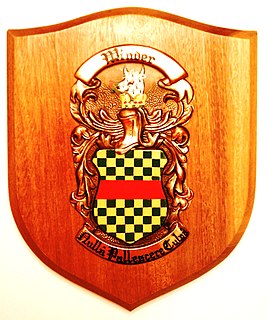This article does not cite any sources .(December 2009) (Learn how and when to remove this template message) |
Schmick is a surname of German origin, similar to the meaning of "smith" as in blacksmith.
This article does not cite any sources .(December 2009) (Learn how and when to remove this template message) |
Schmick is a surname of German origin, similar to the meaning of "smith" as in blacksmith.
The name is first found in the northern provinces that were later to make up Prussia, where the name emerged in mediaeval times as the name of one of the notable families of the region.
Many immigrants from Germany with the surname Schmich changed the spelling to Schmick, in line with the English pronunciation.
Some of the first settlers of the United States with this name or variants were: Anna Maria Schmidt, who went to New York State in 1710; and Johannes Schmidt who went to Germantown, Pennsylvania between 1683 and 1709. Arnd Schmidt emigrated with his family and with many other Schmidts to England or America in 1709.

In some cultures, a surname, family name, or last name is the portion of one's personal name that indicates their family, tribe or community.
Personal names in German-speaking Europe consist of one or several given names and a surname . The Vorname is usually gender-specific. A name is usually cited in the "Western order" of "given name, surname", unless it occurs in an alphabetized list of surnames, e.g. "Bach, Johann Sebastian".

Akins is a Scottish surname and northern Irish family name.
The Rundle family name is a prominent one in many parts of southwest England, particularly Cornwall.

Smith is a surname originating in England. It is the most prevalent surname in the United Kingdom, Australia, Canada, New Zealand, and the United States, and the fifth most common surname in the Republic of Ireland. The surname Smith is particularly prevalent among those of English, Scottish, and Irish descent, but is also a common surname among African Americans, which can be attributed either to black slaves having been given the surname of their masters, or to being an occupational name, as some southern American black people took this surname to reflect their or their father's trade. 2,442,977 Americans shared the surname Smith at the time of the 2010 census, and more than 500,000 people shared it in the United Kingdom as of 2006. At the turn of the 20th century, the surname was sufficiently prevalent in England to have prompted the statement: "Common to every village in England, north, south, east, and west"; and sufficiently common on the (European) continent to be "common in most countries of Europe".
Schmidt is a common German occupational surname derived from the German word "Schmied" meaning "blacksmith" and/or "metalworker". This surname is the German equivalent of "Smith" in the English-speaking world.
Schmidt may refer to:
Douch is an English-language surname meaning German.
Borgman or Borgmann is an Anglo-Saxon and Frisian surname of Dutch, English, German (Germanic) name. It used to be the name given for landlords who worked for kings, royal aristocracy in the Middle Ages. They collected payments, therefore the Dutch name 'borg', to take toll/to take money, and 'man', the person who takes it. In this case this was the landlord. Parts includes Lower Saxony, Groningen, Gelderland, Overijssel, Drenthe, Friesland, Frisia and East Frisia and England.
Butt is a German and an English surname whose origins lie in the South West peninsula region of England.
McGann is an Irish surname, derived from the Gaelic Mac Cana clan, meaning "son of Cana". The Cana particle is a personal name meaning 'wolf cub'.
Schmid is a German surname that is a cognate of "Smith", an occupational surname for a blacksmith. The spelling is more common in Switzerland than Schmidt or Schmitt. Notable people with the surname include:

Wei (魏) is the English spelling of a Chinese surname.
Schmied is a surname of German origin. Its meaning is derived from the German word Schmied, which is a smith. Common variants are Schmidt, Schmitt, and Schmitz.
The German Palatines were early 18th-century emigrants from the Middle Rhine region of the Holy Roman Empire, including a minority from the Palatinate, by which the entire group was known. They immigrated to England as refugees and were both Protestant and Catholic farmers. Towards the end of the 17th century and into the 18th, the wealthy region was repeatedly invaded by French troops during the religious wars. They imposed continuous military requisitions, causing widespread devastation and famine. The winter of 1708 was notably cold, resulting in further hardships. The term "Poor Palatines" referred to some 13,000 Germans who emigrated to England between May and November 1709, seeking refuge. Their arrival in England, and the inability of the British Government to integrate them, caused a highly politicized debate over the merits of immigration. The English tried to settle them in England, Ireland and the North American colonies to strengthen their position abroad.
Bianco is a Northern Germanic surname meaning "white". It is of pre 5th century Frankish origins from North Germany. It derives from the word 'blanc', and the original meaning was 'bright or shining', although this seems to have gradually been changed to mean fair or 'white,' in France and Italy. As such it was given as a sarcastic nickname to the fair haired Viking invaders from Scandinavia, who swept down through Germany, and into France in the 8th and 9th centuries, until stopped by the sea, at what is now 'Normandy', or the country of the Northmen. The earliest recordings as a surname were in the English records known as the Hundred Rolls of landowners for the counties of Huntingdonshire, Leicester and Cambridgeshire where the name is recorded as Blanke, Blaunche and Blanche, and sometimes with the prefix 'le'. Early examples of surname recordings include William le Blanc, given as being a count of France in 1334, with the coat of arms of a red field, a chief silver, and overall a gold lion rampant, whilst in Italy the arms of Bianco granted in 1477, have the blazon of a red field charged with three silver fleur de lys, suggesting victory over the French. The first recorded spelling of the family name anywhere in the word is believed to be that of Nigellus le Blanke. This was dated 1196, in the Pipe Rolls of Leicestershire, during the reign of King Richard 1st, known as 'The Lionheart', 1189 - 1199. Surnames became necessary when governments introduced personal taxation. In England this was sometimes known as the Poll Tax. Throughout the centuries, surnames in every country have continued to "develop" often leading to astonishing variants of the original spelling.

Bain or Bains is an English, French, Punjabi (Jatt), and Scottish surname. It may also be a variant form of a German surname.
Kimberley is a surname in the English language. A variant form of the surname is Kimberly.

Winder is a surname originating from England seen primarily in the United Kingdom and the English-speaking nations, but also in some places in mainland Europe, particularly Austria.
The surname Wilhoite is of German origin. This Americanized surname was derived from the German surname Willeit or Wilheit, which is a variant form of Willeitner. The Wilhoite name can trace its origin back to the northern part of the German state of Bavaria. Willeitner, is a habitational name from a more recent adaptation of the place named Weillitnen in northern Bavaria. Willeit is probably a toponymic name from Middle High German wil ‘small settlement’ + leite ‘slope’. The origins of toponymic by-names have been attributed to two non-mutually exclusive trends. One was to link the nobility to their places of origin and their feudal holdings and provide a marker of their status, while the other relates to the growth of the burgher class in the cities, partly via migration from the countryside.